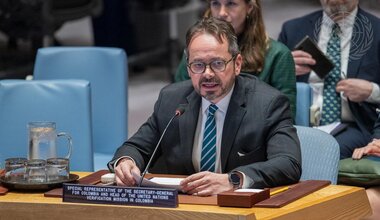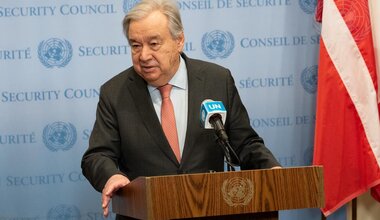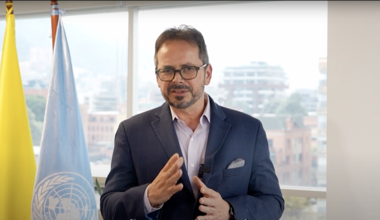In Nariño, the UN Mission supports indigenous communities in the reincorporation process to build bridges of reconciliation.
In Nariño, the UN Mission supports indigenous communities in the reincorporation process to build bridges of reconciliation.
The Ethnic Chapter of the Peace Agreement is coming true in Nariño through art and sports and by consolidating safe environments for youth in the department.
"Peace will come after all the guns are silenced, and when there is no hatred or revenge, there will be peace in all corners, and hope will shine in the fields". The phrase was cited by the poet, bricklayer and carpenter, Luis Antonio Goyes, last December 15, before fifty people who gathered in the community hall of the village of Miraflores, in the municipality of Cumbal, in the mountains of Nariño, on the border with Ecuador.

"Peace will come after all the guns are silenced, and when there is no hatred or revenge, there will be peace in all corners, and hope will shine in the fields".
The phrase was only part of the speech, which he delivered as a poem, on the closure of the project 'Painting Paths of Peace'. This project brought to the Ethnic community of Los Pastos, a playground, sports equipment and a mural, in which Goyes' face was engraved, as a tribute to the elders of this indigenous community.

"I am so proud to see how this sector is evolving; I love to see this. Today we received some balls, sports uniforms, chairs and tables for this community hall in addition to the playground. These are not many things, but for a forgotten and stigmatized community like this one, this is very significant", said Cielo Patricia Díaz, leader of the village.
The community also recognized the work of Adriana Cuaspud, a Reincorporation leader in Nariño, who was one of the driving forces behind this project. Her advocacy and political dialogue have made it possible to put this small village on the map, which continues to suffer the harshness of the armed conflict. "Us (former combatants) lived through part of this war, some of us, like me, got out alive, and we are here to support peace," she said.

At the culmination of the event, there was a sports championship, a minga (indigenous gathering) and a community lunch to celebrate the implementation of the project, which was carried out to create bridges of reconciliation between indigenous people in the process of reincorporation and their communities, as well as to strengthen the protective environments of children and young people.
According to Margoth Botina, the representative of Redepaz, the National Network of Citizen Initiatives for Peace and Against War located in Pasto, Nariño, one of the strengths of this project is that it was agreed upon with the community through The Tulpa, "which is a traditional space for dialogue in indigenous communities. The murals and this beautiful social project were built based on these dialogues," he added.
This initiative was carried out by the United Nations Verification Mission in Colombia, with the support of Redepaz and a group of artists from 'Painting Seeds of Peace', formed by Johan and Esteban Carreño, and Cristhian Castillo, from the city of Pasto. It was supported and accompanied by signatories of the Agreement and the International Organization for Migration (IOM). Another of its objectives was to strengthen the ARN's Community Reincorporation Agendas strategy.

Interventions were carried out in the indigenous reservation Gran Cumbal, in the Miraflores district, in the Mayasquer reservation of Tallambí, in Cumbal. In this municipality resides the second largest reincorporation process population in the department after Tumaco. Another of the communities that benefited was the Cabildo Edén Cartagena, in the municipality of Ricaurte.
Edén Cartagena wants to live in peace.
In the Cabildo Eden Cartagena, in Ricaurte, Nariño, on Saturday, December 10, another community event was held, in which there was an exchange of knowledge, a sports championship and another mural were painted. This mural highlighted an elderly couple in the community: Mrs Ercilia, an indigenous weaver and Mr Leoncio, a farmer who also plays the marimba.

In this context, in which technological equipment for community use, sports equipment, and uniforms were handed out, members of the indigenous group Awá and former commanders of ethnic origin recognized the importance of these reconciliation processes, which they called fundamental to achieving peace in the territory.


"For us signatories, our work with our communities is significant. We want to tell them that we are here, ready to support reconciliation and peacebuilding," said Edith Carmenza Marín, president of the Association of Reincorporation Ricaurte Nariño for Peace, Asopazricaurte, and leader of people in the process of reincorporation.
A community made a victim of the conflict.
The indigenous governor of the Cabildo Eden Cartagena, Carlos Humberto Ortiz, said that the work that has been done "with the signatories and with the UN, the IOM and ARN, has been very nice. We have held several important meetings for them and us, a victimized community that continues to be affected by violence. We only want to live in peace and that any armed group in the area respect our autonomy and human rights".

Almost all of the current inhabitants of this cabildo are displaced people from the indigenous reservation Magüí, and other reservations in the municipality of Ricaurte. They arrived in Eden Cartagena in 2006, and only in 2009 was this territory recognized as an indigenous council. Since 2011, they have been seeking recognition as a reservation to receive direct deposits from the government to promote social projects for this community that continues to be affected by the presence of armed actors.
In these areas, as well as throughout the department of Nariño, and in the most remote regions of the country, the United Nations Verification Mission in Colombia is present to verify the implementation of specific points of the Peace Agreement: reincorporation and security guarantees; to verify compliance with the restorative sentences of the Special Justice for Peace; the implementation of the Comprehensive Rural Reform and the Ethnic Chapter, and, in general, for to support Colombians in their search for a stable and lasting peace.

By: Jorge Quintero
Public Information Officer - Regional Pasto
UN Verification Mission in Colombia
 UN
UN





